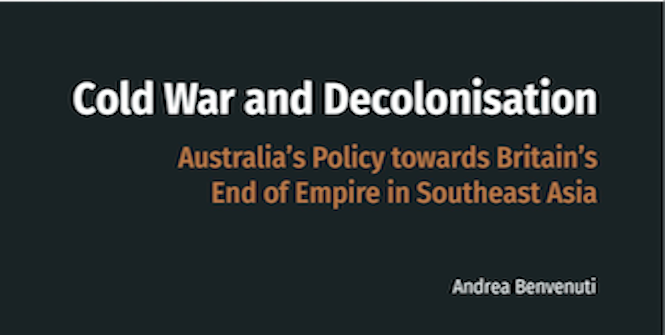Reading Room: Australia’s Policy towards Britain’s End of Empire in Southeast Asia

In Cold War and Decolonisation, Andrea Benvenuti has written a careful analysis of Australian policy towards the decolonisation of Malaya, the British Borneo territories and Singapore.
This study is based on a very thorough examination of the official and diplomatic documentation, Australian and British, and can be recommended on that basis. Its main focus is on the period between April 1955, when the Menzies government committed troops to the Commonwealth Strategic Reserve in the Malayan theatre, and March 1963, when Australian policymakers had resolved that the Indonesians must be informed that persisting with ‘confrontation’ risked open conflict.
Benvenuti emphasises the dilemma faced by the Menzies government. The region was of vital strategic concern to Canberra but it was not always easy to gain access to the inner workings of the British policy machine. Australia was also hesitant to speak with too loud or insistent a voice lest it be expected to perform more of the heavy-lifting.
Nevertheless, the mis-match between Australian concerns and the scale of the Australian military (and development) effort was not lost on some British commentators. At the same time, there were always lingering doubts regarding the durability of the British commitment to the region and concerns that Australia might embark on a course that would have to be sustained alone. Indeed, as Benvenuti shows, just as the decision was taken to warn the Indonesians that Australia was determined to defend Malaysia (as well as to increase defence expenditure to provide the resources that might be necessary) the British were quietly studying ways to cut defence-spending in Southeast Asia. As he notes, once confrontation collapsed, the British exit was rapid and unceremonious.
What the book lacks is a sense of where the Menzies government sat in the wider context of informed debate and public opinion. There is almost no reference to any press commentary or academic analysis from those years, though there was no shortage of either. Moreover, there is very little discussion of the position taken by the Labor opposition on these or related questions. Was Menzies leading or following?
There is no reference either to Menzies’ other initiatives – Suez, his proposal at the UN General Assembly in 1960 – which would have given context for his views of post-colonialism. The author contends that Menzies was ‘prudent’ in his calculations but on the larger questions, though there was an abundance of insightful bureaucratic talent devoted to their analysis, his government rarely issued any definitive policy. On the question of the formation of ‘Greater Malaysia’, for example, the Cabinet resolved in 1961 to support the British position but to “avoid any special initiative or advocacy one way or the other’”. If this response was prudent, it was also pusillanimous.
At the outset, the author contends that while “much of the current literature on Australia’s engagement with Asia is critical of Menzies’ approach to decolonisation”, this approach is to “misread the prudential concerns that underpinned Menzies” foreign policy.’
A review of this literature would surely test such an ambitious claim—which would indeed provide something of the context that is missing—but it is puzzlingly absent from the pages that follow. To be sure, Benvenuti cites a number of Australian scholars, including Edwards, Goldsworthy, Waters, Dee, Lee, Lowe, Boyce and Woodard but always with approval.
In retrospect, it can be said that the ‘Greater Malaysia’ project was audacious but seriously flawed. There were deep fractures in its components. Lee Kwan Yew could only retain control of Singapore in the period in question thanks to the timely intervention on three occasions by British security authorities who conveniently detained his leftist intra-party opponents just as they had gained the upper hand. The Cobbold commission’s review of opinion in the Borneo territories on the proposed merger with Malaysia was a travesty. In neighbouring Brunei, British military forces were required to suppress a popular revolt aimed at removing the Sultan’s autocracy. One of the strengths of this study is to show just how aware Australians were about these problems, Tom Critchley being the supreme example.
Andrea Benvenuti, Cold War and Decolonisation: Australia’s Policy towards Britain’s End of Empire in Southeast Asia (Singapore: National University of Singapore Press, 2017). ISBN 9 789814 722193
James Cotton FAIIA is an emeritus professor at the University of New South Wales, ADFA, Canberra. He is a fellow of the Australian Institute of International Affairs.
This article is published under a Creative Commons Licence and may be republished with attribution.



